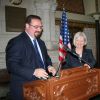It will take a nation to end modern slavery
By Joy Smith, Catholic Register Special
On New Year’s Day, Pope Francis delivered his annual World Day of Peace message that passionately called for an end to modern-day slavery. The title, “No longer slaves, but brothers and sisters,” is taken from St. Paul’s letter to Philemon. Pope Francis noted that “slavery is rooted in a notion of the human person which allows him or her to be treated as an object” and highlighted the many forms of modern-day slavery, including “persons forced into prostitution, many of whom are minors.”
Consumer awareness can help fight modern-day slavery
OTTAWA - Consumers should ensure products they buy are not produced by modern-day slaves, said the American Ambassador-at-large who monitors and combats human trafficking.
“It takes a cultural shift,” Ambassador Luis CdeBaca told a gathering of MPs, senators, diplomats and NGOs on May 17.
CdeBaca, who works under U.S. Secretary of State Hillary Clinton, said consumers must ask themselves: “Where did the shrimp come from that I’m eating? Where did the chocolate come from that I’m eating?”
Brazil’s fight against modern slavery
Brazil is now the world’s sixth largest economy and economists project it will be the fifth largest by the end of this year. It has an advanced aerospace industry, some of the most sophisticated telecommunications companies in the world and more billionaires than Japan. It also has slaves.
Between 25,000 and 40,000 Brazilians every year are trafficked into slavery. On average, government anti-slavery teams free 4,500 people per year.
“When I went to Brazil for the first time (in the 1990s) I was far from imagining that slavery was still existing,” said French-born Dominican Brother Xavier Plassat. “For me it was a discovery.”




